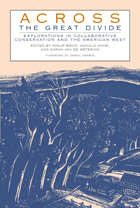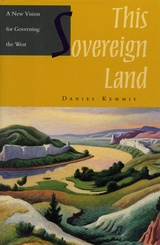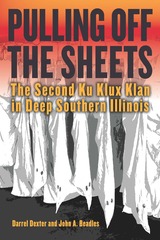
Amid the policy gridlock that characterizes most environmental debates, a new conservation movement has emerged. Known as “collaborative conservation,” it emphasizes local participation, sustainability, and inclusion of the disempowered, and focuses on voluntary compliance and consent rather than legal and regulatory enforcement. Encompassing a wide range of local partnerships and initiatives, it is changing the face of resource management throughout the western United States.
Across the Great Divide presents a thoughtful exploration of this new movement, bringing together writing, reporting, and analysis of collaborative conservation from those directly involved in developing and implementing the approach. Contributors examine:
- the failure of traditional policy approaches
- recent economic and demographic changes that serve as a backdrop for the emergence of the movement
- the merits of, and drawbacks to, collaborative decision-making
- the challenges involved with integrating diverse voices and bringing all sectors of society into the movement
In addition, the book offers in-depth stories of eight noteworthy collaborative initiatives -- including the Quincy Library Group, Montana's Clark Fork River, the Applegate Partnership, and the Malpai Borderlands -- that explore how different groups have organized and acted to implement their goals.
Among the contributors are Ed Marston, George Cameron Coggins, David Getches, Andy Stahl, Maria Varela, Luther Propst, Shirley Solomon, William Riebsame, Cassandra Moseley, Lynn Jungwirth, and others. Across the Great Divide is an important work for anyone involved with collaborative conservation or the larger environmental movement, and for all those who care about the future of resource management in the West.

In the eight states of the interior West (Arizona, Colorado, Idaho, Montana, Nevada, New Mexico, Utah, and Wyoming), 260 million acres -- more than 48 percent of the land base -- are owned by the federal government and managed by its Washington, D.C.-based agencies. Like many other peoples throughout history who have bristled under the controlling hand of a remote government, westerners have long nursed a deep resentment toward our nation's capital. Rumblings of revolution have stirred for decades, bolstered in recent years by increasing evidence of the impossibility of a distant, centralized government successfully managing the West's widespread and far-flung lands.
In This Sovereign Land, Daniel Kemmis offers a radical new proposal for giving the West control over its land. Unlike those who wish to privatize the public lands and let market forces decide their fate, Kemmis, a leading western Democrat and committed environmentalist, argues for keeping the public lands public, but for shifting jurisdiction over them from nation to region. In place of the current centralized management, he offers a regional approach that takes into account natural topographical and ecological features, and brings together local residents with a vested interest in ensuring the sustainability of their communities. In effect, Kemmis carries to their logical conclusion the recommendations about how the West should be governed made by John Wesley Powell more than a century ago.
Throughout, Kemmis argues that the West no longer needs to be protected against itself by a paternalistic system and makes a compelling case that the time has come for the region to claim sovereignty over its own landscape. This Sovereign Land provides a provocative opening to a much-needed discussion about how democracy and ecological sustainability can go hand in hand, and will be essential reading for anyone interested in the West and western issues, as well as for all those concerned with place-based conservation, public lands management, bioregionalism, or related topics.
READERS
Browse our collection.
PUBLISHERS
See BiblioVault's publisher services.
STUDENT SERVICES
Files for college accessibility offices.
UChicago Accessibility Resources
home | accessibility | search | about | contact us
BiblioVault ® 2001 - 2024
The University of Chicago Press









